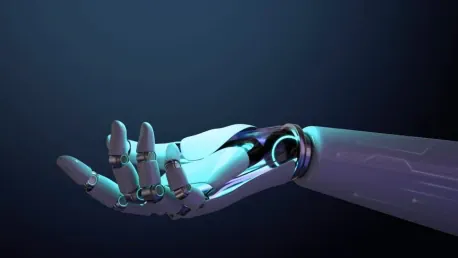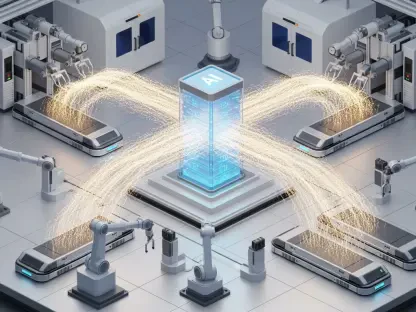The manufacturing industry is experiencing a seismic shift driven by the fusion of Artificial Intelligence (AI) and the Internet of Things (IoT). These technologies are not only enhancing productivity and efficiency but also redefining the very fabric of manufacturing operations. With the advent of AI and IoT, factories are becoming smarter, more connected, and more sustainable, ensuring competitiveness in an increasingly complex market. This transformation is not merely a technological upgrade but a fundamental change in how manufacturing processes are conceived, executed, and optimized. Manufacturers worldwide are increasingly adopting AI and IoT to meet the demands of a fast-paced market and regulatory environment that demands efficiency and sustainability.
The Convergence of AI and IoT: A Game Changer
The integration of AI with IoT, often referred to as AIoT, is shaping the future of manufacturing. AIoT combines the data-gathering capabilities of IoT with the advanced data analytics and decision-making power of AI. Sensors embedded in machines and products continuously collect data, which is then analyzed by AI algorithms to derive actionable insights. This synergy is proving to be a game changer, enabling real-time monitoring and the ability to predict equipment failures before they occur. As a result, manufacturers can optimize production schedules dynamically, maximizing asset utilization and significantly reducing downtime and maintenance costs. Real-time data from IoT devices, when processed by AI, enables predictive analytics, which has become a cornerstone for modern manufacturing strategies.
Moreover, the convergence of AI and IoT is fostering improved human-machine collaboration. Smart machines equipped with AI can assist operators in making better decisions, ensuring higher precision and safety. This synergy between human intelligence and machine intelligence is paving the way for enhanced productivity and operational efficiency. The AI systems analyze a plethora of data points, providing operators with recommendations and alerts that can prevent costly errors and improve overall manufacturing quality. This significant transformation is also driving a shift in workforce skills, with an increased demand for data-savvy employees capable of interpreting AI analytics and managing IoT infrastructure.
Predictive Maintenance: Minimizing Downtime and Costs
Predictive maintenance stands out as one of the most impactful applications of AI and IoT in the manufacturing sector. Traditional maintenance practices often rely on fixed schedules or reactive responses to equipment failures, leading to unnecessary downtime and maintenance expenses. With predictive maintenance, AI algorithms analyze data from IoT sensors to predict when a machine is likely to fail, allowing maintenance to be performed just in time. This transition from reactive to proactive maintenance strategies greatly extends equipment lifespan and ensures optimal performance.
The financial implications are significant, translating to increased production capacity and reduced maintenance costs. By predicting equipment failures with remarkable accuracy, manufacturers can avoid unexpected breakdowns that disrupt production schedules. This shift not only reduces costly downtime but also enhances the reliability and safety of manufacturing operations, minimizing the risk of accidents and ensuring compliance with regulatory standards. Predictive maintenance thus becomes a critical component in achieving operational excellence and maintaining high standards of safety and reliability in manufacturing environments.
Enhancing Operational Efficiency with Smart Manufacturing
Smart manufacturing leverages AI and IoT to create highly efficient, adaptable, and automated production environments. By utilizing real-time data and AI-driven analytics, manufacturers can optimize every aspect of their operations, from supply chain management to quality control. IoT devices collect vast amounts of data on production processes, which AI systems then analyze to identify inefficiencies and potential improvements. These insights enable manufacturers to optimize the flow of materials and products through the factory, reducing waste and ensuring just-in-time delivery. This adaptability leads to more agile and responsive manufacturing systems, capable of quickly adjusting to changing market demands.
Furthermore, smart manufacturing supports the implementation of advanced automation technologies, such as autonomous robots and cobots (collaborative robots). These intelligent machines can perform complex tasks with precision and reliability, freeing up human workers to focus on higher-level activities. The result is a more productive workforce and a streamlined manufacturing process. By integrating AI and IoT, manufacturers can leverage data-driven decisions to enhance overall efficiency, improve quality, and reduce operational costs. This holistic approach to smart manufacturing ensures that factories can consistently deliver high-quality products while remaining competitive in a rapidly evolving market.
Sustainability and Energy Efficiency: A Greener Manufacturing Future
AI and IoT are driving significant advancements in sustainable manufacturing. The ability to monitor and optimize energy consumption in real time allows manufacturers to reduce their carbon footprint and achieve greater energy efficiency. Smart factories equipped with IoT sensors can track energy usage at granular levels, from individual machines to entire production lines. AI algorithms analyze this data to identify patterns and anomalies, enabling manufacturers to implement energy-saving measures. For example, AI can suggest optimal operating conditions for machinery or recommend equipment upgrades to enhance energy efficiency. These insights not only lower energy costs but also contribute to broader environmental sustainability goals.
Moreover, AI and IoT are facilitating the transition towards a circular economy. By optimizing resource usage and reducing waste, manufacturers can minimize their environmental impact and create more sustainable production cycles. The integration of these technologies is essential for meeting stringent regulatory requirements and aligning with global sustainability standards. As manufacturers strive to achieve zero waste and energy-efficient operations, AI and IoT provide the tools needed to monitor, manage, and optimize their processes. This transformation is crucial for creating a more sustainable manufacturing sector that can meet both current and future environmental challenges.
The Challenges and Future of AI and IoT in Manufacturing
The manufacturing industry is undergoing a major transformation, fueled by the integration of Artificial Intelligence (AI) and the Internet of Things (IoT). These cutting-edge technologies are not only boosting productivity and efficiency but are also changing the core of manufacturing operations. AI and IoT are making factories smarter, more interconnected, and more sustainable, which is crucial for staying competitive in today’s complex market. This shift is more than just a technological upgrade; it represents a fundamental change in how manufacturing processes are designed, carried out, and optimized. Manufacturers across the globe are increasingly embracing AI and IoT to keep pace with the fast-moving market and stringent regulatory environment that emphasize efficiency and sustainability. The collaborative power of AI and IoT is setting new benchmarks in manufacturing, driving innovation, reducing costs, and improving quality control. As these technologies continue to evolve, they promise to further revolutionize the industry, creating smarter factories that are better equipped to meet future challenges.









